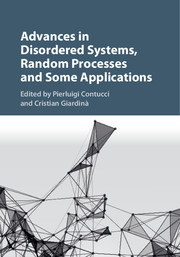Book contents
- Frontmatter
- Contents
- List of Contributors
- Preface
- 1 Topological Field Theory of Data: Mining Data Beyond Complex Networks
- 2 A Random Walk in Diffusion Phenomena and Statistical Mechanics
- 3 Legendre Structures in Statistical Mechanics for Ordered and Disordered Systems
- 4 Extrema of Log-correlated Random Variables: Principles and Examples
- 5 Scaling Limits, Brownian Loops, and Conformal Fields
- 6 The Brownian Web, the Brownian Net, and their Universality
- Index
Preface
Published online by Cambridge University Press: 19 January 2017
- Frontmatter
- Contents
- List of Contributors
- Preface
- 1 Topological Field Theory of Data: Mining Data Beyond Complex Networks
- 2 A Random Walk in Diffusion Phenomena and Statistical Mechanics
- 3 Legendre Structures in Statistical Mechanics for Ordered and Disordered Systems
- 4 Extrema of Log-correlated Random Variables: Principles and Examples
- 5 Scaling Limits, Brownian Loops, and Conformal Fields
- 6 The Brownian Web, the Brownian Net, and their Universality
- Index
Summary
Modern science is witnessing a peak of intense activity toward the study of complex systems. This new topic is a very heterogeneous variety of approaches, methods and perspectives that share the common attempt to understand the collective behavior of a very large number of units correlated by simple competitive and cooperative interactions. These types of investigations have indeed appeared several times in the past. Recently though, the availability of large databases and the advent of unprecedented computer facilities have created a fertile ground for the current boost. Moreover, the progress made in the studies of non-homogenous, disordered systems of the last two decades has produced new promising approaches and technical tools for applied research topics. The analysis of such objects has led to a fruitful dialog involving mathematics and physics as founding and guiding disciplines, with an increasingly growing contribution of specific problems from the socio-economic, biological and other sciences. The present book is a collection of selected contributions by leading world experts toward the process of building up a rigorous conceptual framework within these new ideas that have irrigated the exact sciences, revealing a host of new questions, strategies and solutions.
The volume opens with the contribution by Mario Rasetti and Emanuela Merelli that focuses on a new approach to Data Science that challenges the traditional ones. The authors, after a broad introduction that encompasses motivational arguments and epistemological reasonings, build up a general framework identifying it with a topological field theory of data. The theoretical physics scheme of field theory is proposed as a guide where the relevant information is encoded into topological features as it happens, for instance, in general relativity and its geometrical curvature theory. The content is grounded on a rich and articulated scientific culture and presents a wide set of novel and brilliant ideas. The strategy and vision introduced have the potential to widely impact the field by providing a unified, pre-axiomatic framework, that is able to guide instances and specific case studies.
The contribution by Elena Agliari deals with stochastic processes for diffusion phenomena and statistical mechanics techniques for complex systems, showing the strong analogies between the two theories from a methodological point of view.
- Type
- Chapter
- Information
- Publisher: Cambridge University PressPrint publication year: 2016

